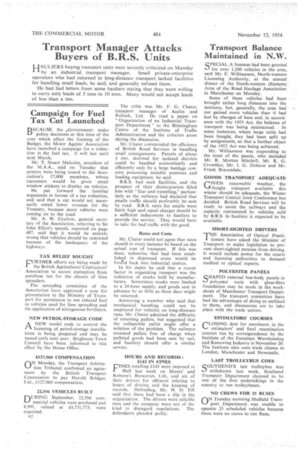Transport Manager Attacks Buyers of B.R.S. Units
Page 36

If you've noticed an error in this article please click here to report it so we can fix it.
HAULIERS buying transport units were severely criticized on Monday by an industrial transport manager. Small private-enterprise operators who had returned to long-distance transport lacked facilities
for handling small loads, he said, and generally refused them. .
He had had letters from some hauliers stating that they were willing to carry only loads of 5 tons to 10 tons. Many would not accept loads of less than a ton.
The critic was Mr. F. 0. Chater, transport manager of Accles and Pollock, Ltd. He read a paper on "Organization of an Industrial Transport Department" to the Birmingham Centre of the institute of Traffic Administration and the criticism arose during the discussion.
Mr. Chater commended the efficiency of British Road Services in handling small consignments. Parcels of about cwt. destined for isolated districts could be handled economically and efficiently only by a large haulage concern possessing suitable premises and loading equipment, he said.
B.R.S. had such facilities, and the prospect of their disintegration filled him with "fear and trembling." particularly as the railways had declared that smalls traffic should preferably be sent by road. B.R.S. rates for smalls were fairly high and equal charges should be a sufficient inducement to hauliers to provide the service. They would have to take the bad traffic with the good.
Rates and Costs
Mr. Chater could not agree that rates should in every instance be based on the actual cost of transport. If this was done. industries that had been established in depressed areas would be lot-died back into industrial centres.
In his paper he said that a recent factor in organizing transport was the reduction of stocks held by manufacturers. Sometimes stocks were limited to a 24-hour supply. and goods sent in advance by as little as three days might be returned.
Answering a member who said that mechanical handling could not be employed for vehicles on long-distance runs, Mr. Chater admitted the difficulty of returning pallets, but suggested that the collapsible pallet might offer a solution of the problem. The railways returned patlets free of charge when palleted goods had been sent by rail, and hauliers should offer a similar service.
HOURS AND RECORDS: £143 IN FINES
FINES totalling £143 were imposed at Hull last week on Moors' and Robson's Breweries, Lid., and six of their drivers for offences relating to hours of driving and the keeping of records. Defending, Mr. N. 0. Till said that there had been a slip in the organization. The drivers were reliable men and the company were not of the kind to disregard regulations. The defendants pleaded guilty.




































































































